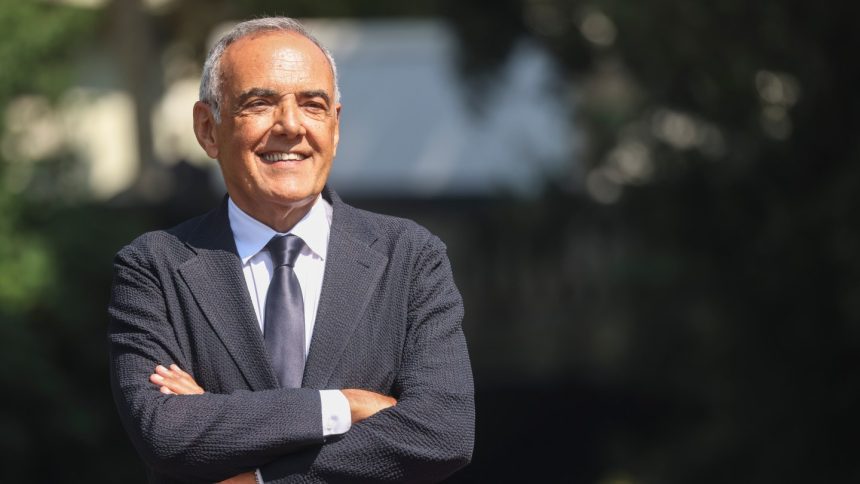Venice Strikes Back: Alberto Barbera on His Powerhouse 2025 Festival Lineup
After getting upstaged by Cannes at this year’s Oscars — when Sean Baker’s Palme d’Or winner Anora took best picture overBrady Corbet’s Lido champ The Brutalist — Venice has come roaring back.
Venice’s 2025 lineup, with its blend of prestige auteurs, big-name debuts and politically charged provocations, reaffirms the Lido as the premiere launchpad for award-season hopefuls. Highlights this year include Julia Roberts in Luca Guadagnino’s After the Hunt, Dwayne Johnson in Benny Safdie’s The Smashing Machine and a triple threat from Netflix: Guillermo del Toro’s Frankenstein starring Jacob Elordi, Noah Baumbach’s Jay Kelly with George Clooney and Kathryn Bigelow‘s A House of Dynamite with Idris Elba and Rebecca Ferguson.
Add in new features from Yorgos Lanthimos, Jim Jarmusch, Park Chan-wook, François Ozon, Paolo Sorrentino, Mona Fastvold, Gus van Sant, Julian Schnabel, Mamoru Hosoda and Laszlo Nemes, and the political heft of Kaouther Ben Hania’s Gaza drama The Voice of Hind Rajab and Olivier Assayas’ The Wizard of the Kremlin [withJude Law as Vladimir Putin], and you have, on paper, one of the best Venice festivals in years. That’s saying something.
Shortly after unveiling this year’s program, Venice artistic director Alberto Barbera spoke to The Hollywood Reporter about the fierce but friendly rivalry between the major festivals, the challenge of programming two-to-three-hour epics and why politics are back on screen in a big way.
You Might Also Like
This is going to sound like I’m a broken record, because I say it every year, but you have another phenomenal lineup. We in the press always pit the big festivals — Cannes, Venice, Toronto — against one another, but how much is competition, a desire to beat the other big festivals, a drive for you?
I’m a good friend of [Cannes festival director] Thierry [Fremaux] and [Toronto Film Festival CEO] Cameron [Bailey]. We’re colleagues. We meet each other at each other’s festivals. I’ve got a wonderful relationship with them. But of course, it is a competition. That’s just a fact. There is competition between festivals, and each of us tries to get the best films from what the market gives us.
We are lucky in that we’re maybe in a better position, coming at the beginning of the new season, where Cannes is at the end of the old one. And we’re a week, 10 days, ahead of Toronto, so we are often lucky to get a lot of world premieres. I know Toronto tries to get as many world premieres as possible, and they don’t always succeed in competing with us on certain films.
But this competition is a way to push you to do your best, to get the best out of the submitted films.
How do you measure success for a festival lineup?
The first element is the way the film is accepted during the festival, the response of both the critics and the audience to the film. That’s the first moment when you realize if you made a good choice or if you were wrong. Because when you invite one film, it means you give up the chance to invite another. And it always happens that this or the other film doesn’t meet the expectations that were created when we announced the lineup. That first moment when the film screens is when I realize if I did a good job or not.
Then, of course, if the film travels to other festivals or gets awards, if it goes to or wins the Oscars, which happens a lot, that helps to confirm and establish the position of the festival, of our position in the international calendar of festivals, and gives us the chance the following year to get access to the most interesting and important films of the season.
In your presentation, you suggested you would have liked to have put Luca Guadagnino’s After the Hunt in competition. Was it Amazon MGM that wanted it to run out of competition?
That was a decision by Amazon MGM. From the beginning, when they showed the film to us, they told us “We don’t want to be in competition. This is a film we believe in. It’s our candidate for the Oscars. It doesn’t need to be in competition.” So I accepted that. I respect the decision of producers. Most of the time.
After the Hunt star Julia Roberts will make her Venice debut this year, as will Dwayne Johnson, star of Benny Safdie’s competition film The Smashing Machine. Any advice for the Lido newbies on navigating the Venice red carpet?
I’m sure they know how to behave. They are great professionals, both of them. And they are delivering exceptional performances in the two films that we’ll see. Both Julia Roberts and Dwayne Johnson are really outstanding. So I’m very happy to have them in Venice. As you know, we have a wonderful new audience, very warm, very gentle. I think the experience here is easier for talents than at other festivals — that’s what they tell me.
Partially due to the success that you’ve had over the years, more and more people are coming to Venice. How much pressure is that putting on the festival’s infrastructure?
A lot. Well, not on the festival itself, because we have a lot of seats, a lot of theaters, to accommodate everybody. The pressure is put on the infrastructure outside the festival, on the hotels, the restaurants, and so on. Venice is one of the most touristic places in the world, with a lot of events at the end of August and the beginning of September. There are a lot of people coming in, also for other events. It’s difficult to find hotels, and it’s becoming more and more expensive to attend.
This is the main issue we have. We don’t have enough hotels on the Lido, actually, just one five-star hotel, The Excelsior. The good news is that they are going to renovate the Grand Hotel Des Bains. It will take 4-5 years, but it should come back as beautiful as it was in the past. So I’m quite confident and optimistic about that, because it’s from people from Dubai [Abu Dhabi’s Eagle Hills is backing the $230 million renovation] who have a lot of money. So it should work, right?
I’ve written a few times on behalf of my freelance colleagues who struggle with the cost of going to Venice and also with access to the talent that they need to justify coming. Is there anything that you or the festival can do to address this problem?
It’s extremely difficult to do something regarding the hotels, the cost of the rooms, the restaurants and so on. The infrastructure is just not there. I know there is an issue for some independent journalists to get access to interviews with stars and so on, but again, this is out of our control. It’s the decision of the production team or the press agent for each film. I try to convince them to be more open and available, but they often only stay 48 hours, 72 hours in Venice, because of the cost of staying here, so it’s difficult to meet all the requests they get from journalists. It’s a major problem, but I don’t know what we can do to solve it.
You also mentioned in your presentation how submitted films are getting longer and longer. How big a problem is that when it comes to programming?
It’s a big issue because we usually have four [competition] films a day, in the main theater, two in the afternoon and two in the evening. If every film is two hours long or more, it means the last film won’t start until very late in the evening. It’s a huge problem for everybody. From tomorrow, I’ll start working on the screening schedule, and I’ll see how things look, but I’m a little worried. We’ll find a solution, of course, but it’s not easy.
This is a trend that started one to two years ago and has become a really major trend. Most of the films are more than two hours long, and many are two hours and 30 minutes long or longer. It’s a problem.
Venice has never avoided political films, but current events seem at the center of a lot of movies in this year’s lineup, from Kathryn Bigelow’s A House of Dynamite to Kaouther Ben Hania’s The Voice of Hind Rajab to Olivier Assayas’ The Wizard of the Kremlin. Why did you think it was important to program these movies?
They are all very strong films in of themselves. Not only very emotional but excellent films dealing with contemporary issues. Most of the films this year are dealing with contemporary problems. Whether it’s the use of atomic weapons [A House of Dynamite], to the horrors of the wars in Ukraine or Gaza, or looking at dictatorships in many countries in the world.
It’s the comeback of the cinema of reality, and I think it’s important that the festival is open to the contemporary world and not closed off inside the universe of films and cinema, that cinema of dreams.
There will still be a lot of entertaining films, spectacular films, at the festival, but most of the films are strongly connected to contemporary problems and issues. Some are very strong and emotional. I get emotional talking about The Voice of Hind Rajab. I was so impressed when I watched that film. Every time I think about it, I get emotional again. I think it will be one of the films that will get the most intense response from everybody, from the press and from the audience, for obvious reasons, not only political reasons but for emotional, human reasons.
Netflix is also back in force this year, after missing last year’s festival.
Yes, they couldn’t come last year because they didn’t have any films to offer, but they have three very strong films this year, from Kathryn Bigelow, from Noah Baumbach and from Guillermo de Toro. We worried if it was a good idea to have three films from Netflix in the main competition, but they are all so good, they all deserve to be in there.
Do you ever worry that your streak at Venice will end, that this could be your last good year?
Every time. After every festival, I tell myself, I won’t be able to do as strong a lineup next year. And then we are lucky enough to get access to the most interesting films of the season. And this is the case again. For this year at least.







